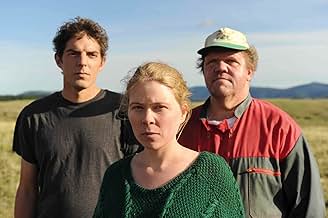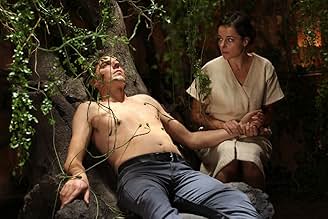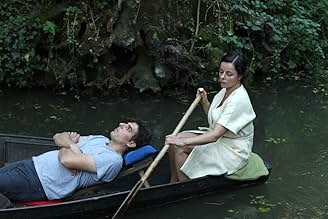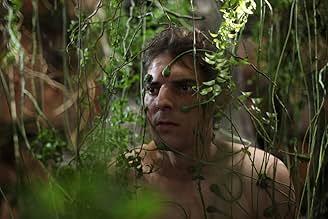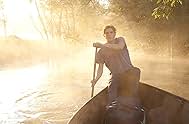IMDb-BEWERTUNG
5,9/10
2611
IHRE BEWERTUNG
Füge eine Handlung in deiner Sprache hinzuA film maker has to raise a child by himself whilst looking for an inspiration for his new film.A film maker has to raise a child by himself whilst looking for an inspiration for his new film.A film maker has to raise a child by himself whilst looking for an inspiration for his new film.
- Auszeichnungen
- 4 Gewinne & 11 Nominierungen insgesamt
Raphaël Thiéry
- Jean-Louis
- (as Raphaël Thierry)
Empfohlene Bewertungen
Could this be Alain Guiraudie's masterpiece? Rich in multiple characters who evolve a great deal over the course of the story. Damien Bonnard, dragging his carcass between India Hair and Raphaël Thiéry. The film is rich in multiple themes, touched on, exposed and evoked. Fatherhood, motherhood, financial misery, social misery, the couple and commitment, caring for a baby, writing a screenplay, social decay, death and wolves. And more.
Alain Guiraudie knows how to give richness, texture, to simple people, in the countryside, among peasants, to people in need. He shows that it's possible to tell a great story, a story of great feelings, without pulling out the artillery you'd find in old Hollywood (big actors, big story, big budget, big novel, etc.).
The story is simple. Damien Bonnard is looking for wolves in Lozère. He meets a shepherdess, India Hair. A few months later, a child is born. But she leaves him alone with the child. So he has to deal with his child, his father-in-law who is willing to take him in, his screenplay sponsor (he's supposed to be writing a screenplay) and his erotic desires, all of which Alain Guiraudie knows how to tackle head-on. Guiraudie's strength lies in putting the viewer in the same position as Damien Bonnard: the spectator discovers things as he does, and never knows any more. As a result, we never know where the story is headed, and can only guess at what the character wants to do; we find out as he does it.
Alain Guiraudie knows how to give richness, texture, to simple people, in the countryside, among peasants, to people in need. He shows that it's possible to tell a great story, a story of great feelings, without pulling out the artillery you'd find in old Hollywood (big actors, big story, big budget, big novel, etc.).
The story is simple. Damien Bonnard is looking for wolves in Lozère. He meets a shepherdess, India Hair. A few months later, a child is born. But she leaves him alone with the child. So he has to deal with his child, his father-in-law who is willing to take him in, his screenplay sponsor (he's supposed to be writing a screenplay) and his erotic desires, all of which Alain Guiraudie knows how to tackle head-on. Guiraudie's strength lies in putting the viewer in the same position as Damien Bonnard: the spectator discovers things as he does, and never knows any more. As a result, we never know where the story is headed, and can only guess at what the character wants to do; we find out as he does it.
Seen at the Viennale 2016: A guy loses his creativity and drifts loose through his best years. But to be honest, we do not know whether this guy was creative in the first place. We can only assume that, because it might be logical. Maybe the whole movie is just some sort of insider-joke for filmmakers. I liked the sexual freedom of this movie, but could not follow the story itself. Many actions of the main guy seemed to happen out of nothing, without the wish of doing something with aim. Without any hint, why the guy is doing what he is doing I (and my brain) was benumbed. Maybe the script writer and the director of that movie had the same problem as the guy. No aim for the movie, no direction. Such is life. Sometimes.
In the 1960s, many French movies were dubbed 'New Wave' because they were so unusual and violated the accepted rules of stories and filmmaking. Characters and plots no longer had to make sense, happy endings and other clichés were abandoned and many of these films were very confusing to many in the audience. Love 'em or hate 'em, they certainly were unique. Not surprisingly, however, over the years the French film industry and their films evolved and the years of deliberately breaking the rules of the New Wave filmmakers slowly disappeared and became more mainstream.
In many ways, "Staying Vertical" is a modern take on the old French New Wave. Like the New Wave, much that the main character does makes little sense, there does not appear to be much context for what occurs and the film itself seems to deliberately avoid having any sort of meaning or coherence. Add to that a very modern sense of sexuality and sexual freedom you don't have in the older New Wave films and you essentially have "Staying Vertical".
The story is revolves around Leo. You really know nothing about Leo other than he exists. He keeps making phone calls begging for money and he keeps pursuing a handsome young man while at the same time taking up with a shepherdess with two kids of her own and, not surprisingly, she soon has Leo's baby. Oddly, despite all this, Leo never once smiles or emotes or shows any connection to anyone and not surprisingly she soon abandons Leo. What is surprising is that she's left their colicky baby with him. Through the rest of the film, Leo takes the baby in tow on a wide variety of odd adventures that culminate in Leo making the newspapers and for something that sounds very sick when you read the paper's headlines.
I must warn you, this film is incredibly explicit and could easily offend. While it's never exactly clear whether Leo is bisexual or is a gay man using the Sheperdess, you have some incredibly surprising scenes. You see close ups of genitalia and erections as well as a super-bizarre sex scene involving Leo and a dying old man. It is certainly not a film for the easily offended and shows an extreme range of sexuality. You also get to see close ups of a baby being born--- and it's no stunt baby or model!
So is all this worth seeing? Well, for me, no but if you love the French New Wave you might be able to find something in the picture worth seeing. I kept hoping my questions would be answered and some coherence would result sometimes it did, but more often it didn't. But worse than the lack of meaning and strangeness, I hated the lack of emotion throughout the film. Apart from one very, very brief outburst by Leo late in the film, Leo simply exists and shows zero emotion and it's the same with the rest of the characters. All of them are people existing going through the motions of life but not living. Overall, it's a very difficult and confusing film and perhaps one that might be better to be watched and discussed with friends instead of seeing it alone. As for me, I adore French movies but cannot wholeheartedly recommend this one.
In many ways, "Staying Vertical" is a modern take on the old French New Wave. Like the New Wave, much that the main character does makes little sense, there does not appear to be much context for what occurs and the film itself seems to deliberately avoid having any sort of meaning or coherence. Add to that a very modern sense of sexuality and sexual freedom you don't have in the older New Wave films and you essentially have "Staying Vertical".
The story is revolves around Leo. You really know nothing about Leo other than he exists. He keeps making phone calls begging for money and he keeps pursuing a handsome young man while at the same time taking up with a shepherdess with two kids of her own and, not surprisingly, she soon has Leo's baby. Oddly, despite all this, Leo never once smiles or emotes or shows any connection to anyone and not surprisingly she soon abandons Leo. What is surprising is that she's left their colicky baby with him. Through the rest of the film, Leo takes the baby in tow on a wide variety of odd adventures that culminate in Leo making the newspapers and for something that sounds very sick when you read the paper's headlines.
I must warn you, this film is incredibly explicit and could easily offend. While it's never exactly clear whether Leo is bisexual or is a gay man using the Sheperdess, you have some incredibly surprising scenes. You see close ups of genitalia and erections as well as a super-bizarre sex scene involving Leo and a dying old man. It is certainly not a film for the easily offended and shows an extreme range of sexuality. You also get to see close ups of a baby being born--- and it's no stunt baby or model!
So is all this worth seeing? Well, for me, no but if you love the French New Wave you might be able to find something in the picture worth seeing. I kept hoping my questions would be answered and some coherence would result sometimes it did, but more often it didn't. But worse than the lack of meaning and strangeness, I hated the lack of emotion throughout the film. Apart from one very, very brief outburst by Leo late in the film, Leo simply exists and shows zero emotion and it's the same with the rest of the characters. All of them are people existing going through the motions of life but not living. Overall, it's a very difficult and confusing film and perhaps one that might be better to be watched and discussed with friends instead of seeing it alone. As for me, I adore French movies but cannot wholeheartedly recommend this one.
This film has such a strong quirk to it's plot that's easy to put in opposition to quirks & troubles of your own life. And the very ending is when the entire film unwraps before your eyes again; then the quirky plot ceases to matter and the message is absorbed with such intensity that leaves one gasping. All this beside an almost constant visual stun.
Seen at the Rotterdam Film Festival 2017 (website: iffr.com/en). Unorthodox story with convoluted relationships. The film title gets a double meaning at the very end with an original twist, although the rest of the movie is also a matter of staying alive and well, hence suits the various stories very well. With one female and four male main protagonists, gay relationships can be expected albeit very different from the mostly one-to-one overload we saw in predecessor L'Inconnu du Lac / Stranger by the Lake (2013) by the same director. On the other hand, the relationships in the latter were relatively straightforward (due to the "straight" in it, not the best choice of words, no pun intended). In any case, "Stranger by the Lake" followed standard rules with respect to cruising and making love, contrary to this "Staying vertical" that extends the forming of couples far beyond that. It also shows that gay and straight are not black and white orientations in distinct parts of the relational world, thereby very well demonstrating that people can switch easily between both, and be happy òr unhappy in either circumstance.
Overall it is not clear what it is that these people do tick. Except for the father and daughter couple who herd sheep for a living, no one else seems to have a real purpose in life, nor are they otherwise involved in serious business. The movie opens with a scene where our main protagonist stops his car while spotting a young man on foot along the road, he compliments him about his appearance and asks him whether he might be interested in a screen-test (the usual excuse). The young man flatly refuses and disappears from the scene. When asking around, this young man lives in a house nearby, but does not answer when called, and his father sitting on a bench before the house flatly says that it is no use calling further as contact is not desired. Of course, our main protagonist is not prepared to let go of someone looking so attractive, and returns later for a new attempt.
In the meantime, he parks his car and crosses the landscape with his backpack on the lookout for wolves. He encounters a woman herding sheep, who explains him why wolves are bad news. They chit-chat a bit further, so a new connection seems on the agenda. It becomes more complicated, however, after returning the sheep to their stable later that day. Of course, he is invited for dinner and meets her father. Relationships do not develop along the usual lines, and be aware that more unusual turns of events are to follow. The common borders between hetero/homosexual are to be blurred severely, as are the common demarcations in relationships between generations. All sex is on a consensual basis, albeit some rather out of the ordinary.
All in all, less interesting and informative than 2013-predecessor Stranger By The Lake, yet the unexpected relationships and unorthodox ways to have sex, make this movie a good watch, all that augmented by showing what is involved in herding sheep and keeping wolves away. My 7-score (out of 10) is contradicted by the average festival visitor who awarded this movie a lowly 139th place (out of 172).
Overall it is not clear what it is that these people do tick. Except for the father and daughter couple who herd sheep for a living, no one else seems to have a real purpose in life, nor are they otherwise involved in serious business. The movie opens with a scene where our main protagonist stops his car while spotting a young man on foot along the road, he compliments him about his appearance and asks him whether he might be interested in a screen-test (the usual excuse). The young man flatly refuses and disappears from the scene. When asking around, this young man lives in a house nearby, but does not answer when called, and his father sitting on a bench before the house flatly says that it is no use calling further as contact is not desired. Of course, our main protagonist is not prepared to let go of someone looking so attractive, and returns later for a new attempt.
In the meantime, he parks his car and crosses the landscape with his backpack on the lookout for wolves. He encounters a woman herding sheep, who explains him why wolves are bad news. They chit-chat a bit further, so a new connection seems on the agenda. It becomes more complicated, however, after returning the sheep to their stable later that day. Of course, he is invited for dinner and meets her father. Relationships do not develop along the usual lines, and be aware that more unusual turns of events are to follow. The common borders between hetero/homosexual are to be blurred severely, as are the common demarcations in relationships between generations. All sex is on a consensual basis, albeit some rather out of the ordinary.
All in all, less interesting and informative than 2013-predecessor Stranger By The Lake, yet the unexpected relationships and unorthodox ways to have sex, make this movie a good watch, all that augmented by showing what is involved in herding sheep and keeping wolves away. My 7-score (out of 10) is contradicted by the average festival visitor who awarded this movie a lowly 139th place (out of 172).
WUSSTEST DU SCHON:
- WissenswertesAlain Guiraudie films sex very frontally and the first love scene, with this vulva in the foreground, obviously evokes Courbet's The Origin of the World. Asked about her nude scenes, India Hair said: "When Alain read the script, he asked Damien Bonnard and me what we were willing to do and what we thought was more complicated. What I was afraid of was to show an intimacy of my sexuality. There, I would have had difficulties to let myself go. Alain told us that we had to choreograph what we were going to do. That allows us to take some distance. And then I had seen 'L'Inconnu du lac' and I had found it so sublime! We worked some scenes with a double, others without, it was up to us to choose."
- SoundtracksOther Stars
Written by Erik William Johnson
Performed by Wooden Shjips
© House Of Hassle Publishing
(p) 2013 Thrill Jockey Records
With the authorization of Schubert Music Publishing France, Thrill Jockey Records and Bank Robber Music
Top-Auswahl
Melde dich zum Bewerten an und greife auf die Watchlist für personalisierte Empfehlungen zu.
- How long is Staying Vertical?Powered by Alexa
Details
Box Office
- Bruttoertrag in den USA und Kanada
- 12.158 $
- Eröffnungswochenende in den USA und in Kanada
- 4.240 $
- 22. Jan. 2017
- Weltweiter Bruttoertrag
- 456.271 $
- Laufzeit1 Stunde 38 Minuten
- Farbe
- Seitenverhältnis
- 2.35 : 1
Zu dieser Seite beitragen
Bearbeitung vorschlagen oder fehlenden Inhalt hinzufügen

Oberste Lücke
By what name was Haltung bewahren! (2016) officially released in India in English?
Antwort


